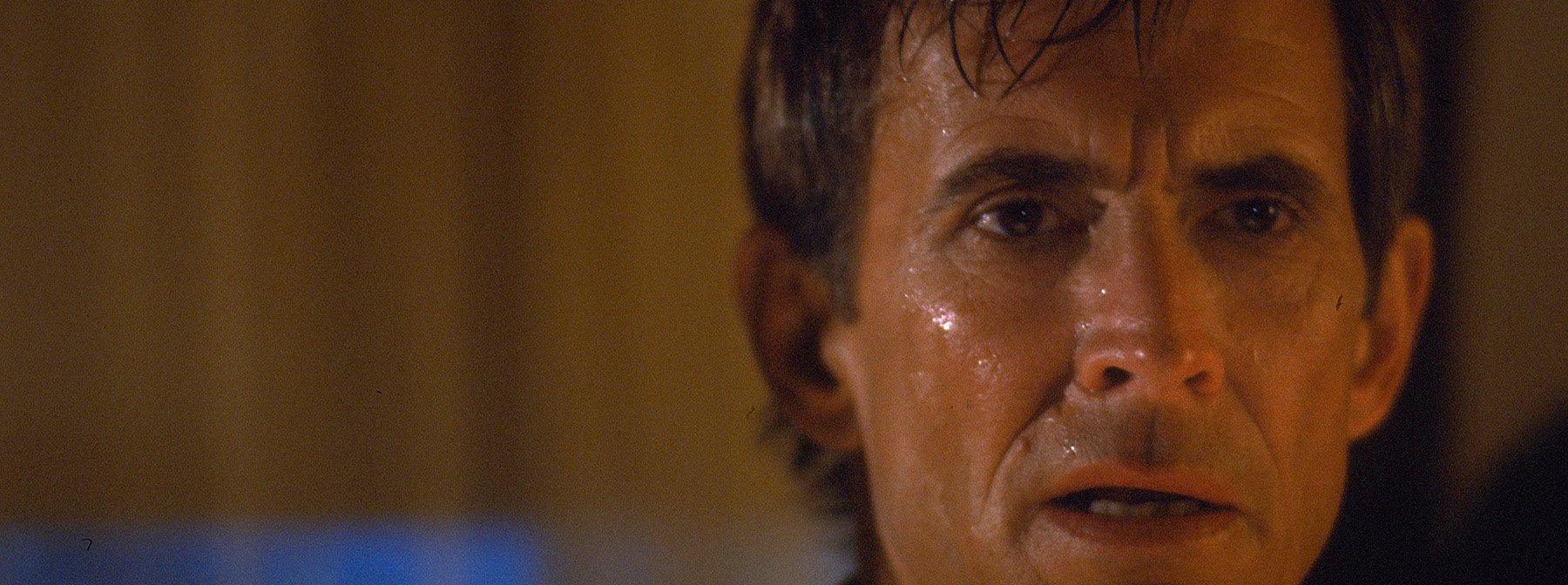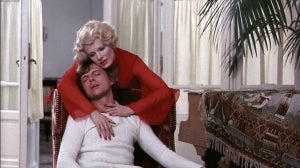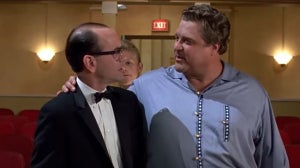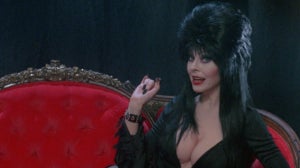
Norman Bates is one of the original slasher killers on screen, ushered into celluloid existence in 1960 by Perkins and Psycho director Alfred Hitchcock. First imagined by Robert Bloch in his 1959 novel of the same name, Bates is our titular psycho - a knife wielding matricidal maniac who has conversations with his dead mother and kills motel patrons at her behest, while dressed in her clothes and wig.
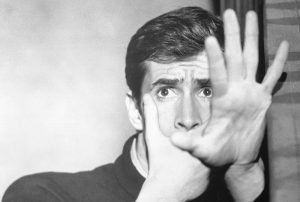
This is a question explored and revisited over four Psycho films, a franchise of surprising consistency considering how one could easily assume any sequels to the original Hitchcock masterpiece might bomb and even potentially harm the legacy of such a perfect film. But Psycho II (1983, dir. Richard Franklin), Psycho III (1986, dir. Anthony Perkins) and Psycho IV (1990, dir. Mick Garris) all do an admirable job of building out Norman’s character and motivations. We spend considerable time with him through the series, centred as our main protagonist in this macabre world of motel murder, and by the end of the fourth instalment audiences may find themselves sympathising for, even rooting for, this problematic fave.

Indeed, the psychiatrist in the closing moments of Psycho lays it all out for us as he explains, after Norman’s capture, that he essentially no longer exists and in fact “only half existed to begin with”. Dangerously disturbed from after his father died, Norman killed both his mother and her lover. But as unbearable as the crime of matricide is, it’s most unbearable to the son who commits it, and he had to undo the crime - so he stole the corpse and hid it in the fruit cellar, beginning to think and speak for her, giving him half his life. The shrink explains, he was never all Norman but could be “all mother”, and had no knowledge of the crimes; like a dutiful son he cleaned up the murders he believed his mother had committed.
As well as the question of mental illness and culpability, Norman can be a likeable character to spend time with. This is a man who’s so ‘polite’ that he can’t even utter the word “bathroom”; even after Hitchcock has shown us the first toilet in cinema, his antagonist cannot say the word aloud.
In a promo interview for the second film, Anthony Perkins described his character as, “a good bloke who’s interested in law and order” and someone who wants to start over and have a productive life, after being found not-guilty by reason of insanity.
In Psycho II, Norman befriends his co-worker Mary (Meg Tilly), taking the blame for her dropping a pie, and letting her stay at the motel when she’s nowhere else to go. “Co-workers oughta help each other out, dontcha think?”, he says. And he fights his darker impulses, determined not to harm her, pausing with the kitchen knife over a sandwich he’s made, despite the haunting flashes of violence that continue to consume him.
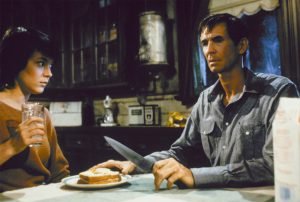
He can be funny too; there’s a measure of comedy to Norman as the series progresses. “Well I don’t kill people anymore, y’know?”, he quips in the second film, and in Psycho III he’s knowing - talking to his new assistant about shifts he says, “I prefer the nights”.
By this third instalment he’s presented as much more humanised, drinking and toasting “to happiness”, dancing and even becoming a romantic figure when he develops a relationship with ex-nun Maureen. In the fourth film, Norman is even married although we do wonder how long a stable relationship can last with such murderous instincts bubbling just beneath his composure.
The sad thing about Norman Bates is he’s such a pitiable monster. Stephen Rebello in his book Alfred Hitchcock and the Making of Psycho (1990) refers to the character as “bizarre” and “pathetic” and a “mama's boy”, and our introduction to Bates in the first film sees him develop a melancholic attraction to Marion. They talk and he admits that his hobby of taxidermy fills his time, rather than passes it, and that he was born into a trap that he says he doesn’t mind but in fact does. And of course he doesn’t have friends; “a boy’s best friend is his mother”.
He’s terrified of her though - obedient to her, aroused by her, later haunted by her memory. In Psycho II, these memories are used against him by Lila Crane (Vera Miles) and her daughter Mary to gaslight him, confusing and disorienting him and setting him back on his dark path. The second iteration really draws out Norman’s vulnerability, and by the end of the film he has charmed Mary and the audience. “He’s trying so very hard to do what’s right, to keep his sanity”, Mary says. The gaslighting of Norman places the audience in a state of compassion; he’s once again been driven to violence and he’s desperate not to go back to the institution from which he’s been released, comforted at one point by Mary like the little boy he never seems to have had the chance to be. When, at the end of the film, he is carted off back to the madhouse, he says that even though he’ll now be locked up forever, “I’ll be free. I’ll finally be free”, and his relief is palpable. This is a motif repeated at the end of Psycho IV, when he burns down the family home and his mother’s ghost with it; “I’m gonna get rid of the past. For good”, he says, “I’m free.”
It’s remarkable that a character who we’ve witnessed commit such violent acts of brutality can engender such sympathy; in two instances involving sinking cars we find ourselves oddly rooting for Norman - one in Psycho when we’re oddly nervous for him when the car containing Marion’s body pauses briefly as it descends into the Bates’ swamp, and secondly in Psycho III when we want him to survive a potentially fatal crash.
It helps of course that Anthony Perkins was such a charming and charismatic actor, and his decision to return to the part over the course of four films imbues Norman with an oddly comforting familiarity for the audience.
Of course there’s nothing comforting about Norman when he turns, and Perkins is delightfully adept at portraying the terrifying mania that continues to take control throughout the series. Perkins seems to perfectly understand the balance that’s needed to keep us invested while also testing our ambiguous loyalties time and again; because let’s face it, these are horror films and it would’ve been a shame if Bates had lost his bite.
This is the thing that makes Norman such an enduring figure in the world of horror - he’s a man we love to fear. Despite his polite ways and protestations of innocence, we’re under no illusion that he is capable of terrible things.

We glimpse it through Marion’s petrified eyes early in their interaction in Psycho, when his politeness turns on a dime at her suggestion of putting his mother in a home. “People always mean well. They cluck their tongues and shake their heads and suggest oh so very delicately”, he says, suddenly furious and unblinking. Soon after this, when we see him alone for the first time, we’re really introduced to Norman when he removes the picture and peers through the hole to her room to watch her undress. He’s a sneak, a creep, a voyeur and later a deranged murderer. For much of the first film, we’re led to believe that the killer is really Mrs Bates but there’s no denying the blood curdling truth when Norman launches himself into the fruit cellar, dressed as his mother and knife aloft, entirely manic and horrifying.
At the end of Psycho II he brains Mrs Spool with a shovel, throughout Psycho III he kills off all manner of motel guests, and in Psycho IV we learn just how early he was committing murder, whether by his own hand or his mother’s. In the closing moments of the final film we are to believe that ‘mother’ is locked away in the basement of the house again, screaming to be let out. And the further screams of the new Bates baby hint at the legacy continuing. Even though Norman says he’s free of the past and his mother’s influence, is he really going to be able to keep his dark urges locked up and/or stop his genes from creating another monster in the Bates line?
Because let’s face it, whether Norman Bates’ evolution throughout the Psycho films makes him an enduringly compelling anti-hero or not, however likeable or sympathetic, one reason we keep coming back to these films time and again is his fascinating character as one of the most recognisable serial killers in horror history. His place in our dark hearts is one of a captivating villain, and each instalment of the franchise succeeds in adding more layers to his troubled and terrifying persona. As horror fans, we don’t love Norman Bates despite his myriad faults, but because of them.
https://youtu.be/vs8kaJHNRoI?feature=shared

